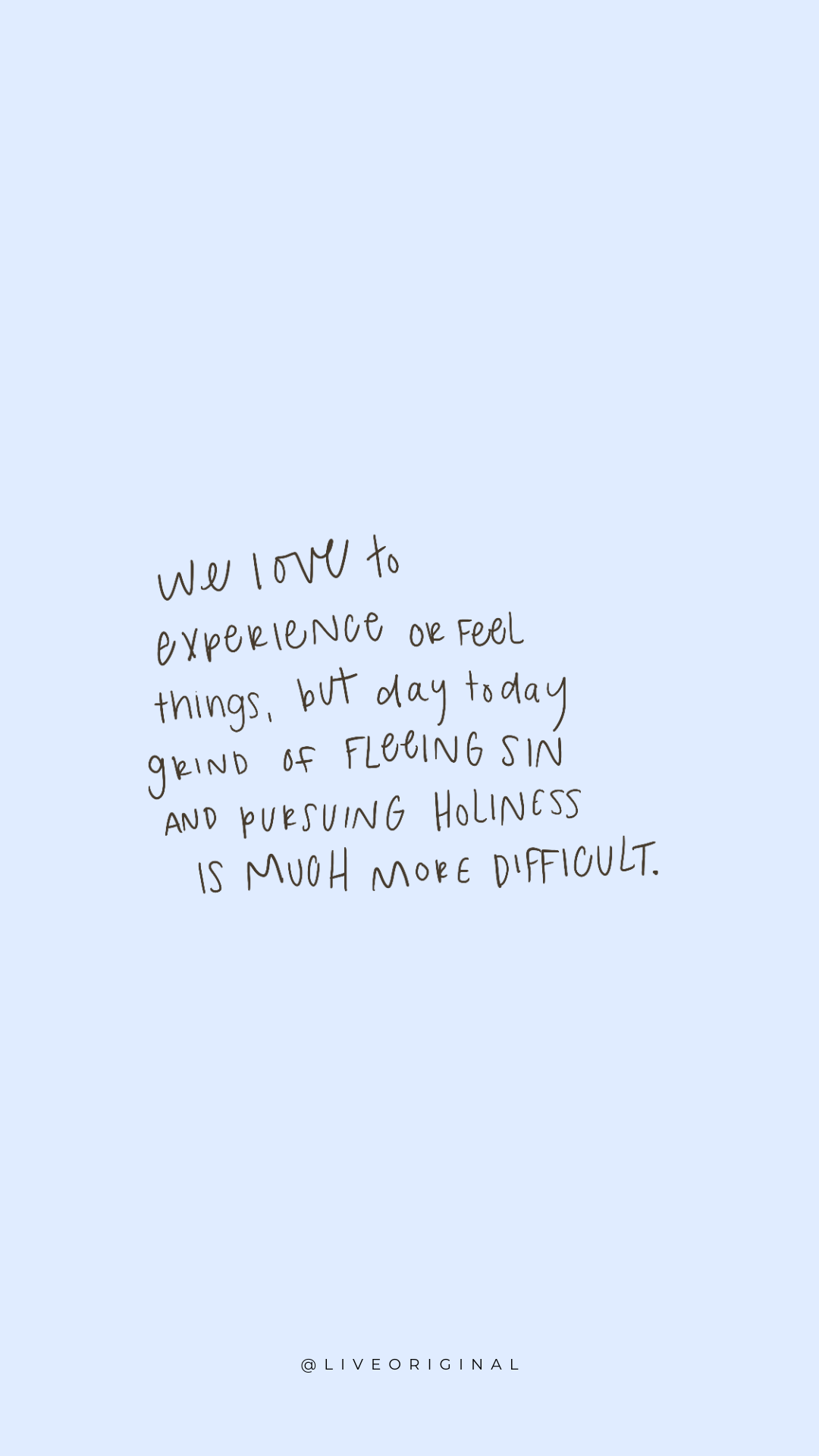We cannot stop a bad habit. We can only replace it with a good one. I become more and more convinced of that reality. We are creatures of habit, and so much of life is making sure we’re building healthy ones. To be completely honest with you (which I intend to be for the entirety of this work), I really wrestled with what to title this book. There were no less than fifty different titles we tried out along the way. The last thing I wanted was for it to sound like another self-help book. Your local bookstore (and even the Christian section of that bookstore) is already full of those. You see, I am not trying to help people be smarter sinners.
It is one of my core beliefs that everyone lives forever somewhere—either in heaven or hell. My goal is to help other Christians, other believers in Jesus, live the righteous lives Jesus desires for us. The only way that will happen is by living fully dependent on the Holy Spirit and by doing the things Jesus calls us to do in this life as we pursue holiness. In fact, 1 Peter 1:15 instructs us to be holy in all that we do. But how do we do that? I don’t know about you, but that seems like an impossibly high bar to me.
If you have ever parented a toddler (or spent any time around one, for that matter), it does not take long to figure out that toddlers lack something called “impulse control.” Their brains aren’t fully developed enough to process all of the pros and cons of the decisions they make, so instead they just do whatever feels good or fun in the moment.
The truth is, while impulse control eventually kicks in, we never quite grow out of that phase of doing the things we know we shouldn’t. There are many things I’ve done that I didn’t really want to do, but I still did them. Not in a resilient, “do hard things” kind of way but in a rebellious, “I know this isn’t good for me, but I’m going to do it anyway” kind of way. And, like Weston, I’m not sure why.
In his letter to the church at Rome (his theological masterpiece), the apostle Paul sums up this internal conflict we all feel at times as believers in Jesus:
“I do not understand what I do. For what I want to do I do not do, but what I hate I do. And if I do what I do not want to do, I agree that the law is good. As it is, it is no longer I myself who do it, but it is sin living in me. For I know that good itself does not dwell in me, that is, in my sinful nature. For I have the desire to do what is good, but I cannot carry it out. For I do not do the good I want to do, but the evil I do not want to do—this I keep on doing.” (Rom. 7:15–19)
We are the same way! We want to pursue what is pure, true, righteous, and holy, but for some reason . . . we don’t. We do things that pull us away from Jesus. We run toward momentary pleasure or temporal satisfaction. We don’t quite know why we do the things we don’t want to do.
There are countless times I have looked at something with a lustful intent, even though everything in me knows I shouldn’t. I have responded in anger to people instead of showing them the same grace I have been shown. I have felt entitled to purchases I want because I think they will fill some void I feel, even though it never quite scratches the itch. Why do I do this? Why do I do what I don’t want to do? And what should I do instead?
Vices & Virtues
If I have learned anything from both my own life and the thousands of individual case studies I have seen up close as a pastor over the past two decades, there are two lessons that stick out the most. One, sin (most often) subtly creeps into our lives. Two, while we love quick fixes, pursuing holiness is a lifelong pursuit full of micro-decisions along the way.
Throughout the pages of this book, we will look at ten different sins (or vices) that seem to trip us up, year after year, generation after generation. With each one of these sins, we will find it can creep into our lives gradually. No one aspires to be consumed by greed or lust, for example. Your heart just often drifts there over time. If you are not careful and on guard, any one of these nine could be the thing that takes you out. At first glance, you may not even feel like it is something you struggle with, but as you press into each chapter and examine your own heart, you may find ways you have been cohabitating with that vice for years without even realizing it.
Along with each sin, there is a corresponding solution (or virtue) to the problem. For example, the solution to the sin of pride is to practice humility. The solution to the sin of anger is to practice forgiveness. We will examine the pages of Scripture to see how to respond in the most God-honoring way we can to each one of these sins that could trip us up.
In his book A Long Obedience in the Same Direction, Eugene Peterson says this:
“There is a great market for religious experience in our world; there is little enthusiasm for the patient acquisition of virtue, little inclination to sign up for a long apprenticeship in what earlier generations of Christians called holiness.”
His point is simple. We love to experience or feel things, but the day-to-day grind of fleeing sin and pursuing holiness is much more difficult. But just because it is difficult does not mean that it isn’t right. This daily commitment to pursuing the things of Jesus is what it means to be a disciple—a follower of Christ. And here is the best part: you can do this.
Change Is Possible
Almost two thousand years ago, the apostle Paul told the church in Rome, “Do not conform to the pattern of this world, but be transformed by the renewing of your mind. Then you will be able to test and approve what God’s will is—his good, pleasing and perfect will” (Rom. 12:2, emphasis added). At first glance, that sounds great in theory, but is it even possible to renew your mind? To put it simply: yes.
Over the past few decades, scientists have learned that you can, in fact, change (or renew) your mind. For centuries, the commonly held assumption among scientists and psychiatrists was that beyond the formative years of childhood and adolescence, the brain was done developing and no longer changeable.
But what they have discovered more recently is something called neuroplasticity (neuro meaning “of the brain” and plasticity meaning that it can change because it is malleable and moldable). This is the idea that if you take your thoughts captive—or if you stop a particular activity and replace it with another activity or thought pattern—that pathway in the brain atrophies and a new pathway is learned.
You create new neurological pathways when you replace these old, bad, destructive, or unhealthy habits and thinking patterns with newer, true, constructive, and healthier ones. How about that? Thousands of years ago, Paul knew what he was talking about! Renewing your mind might be difficult, but it has a promise attached to it: if you do it, you will know God’s will.
My prayer for this book is that, as you read about the vices and virtues described in the pages ahead, the Holy Spirit will show where you have given the enemy (Satan) a foothold into your life and that, by looking to God’s Word, you will renew your mind as you pursue the life Jesus has called you to. Remember: the only way to conquer a bad habit is to replace it with a better one.
Jonathan “JP” Pokluda is lead pastor of Harris Creek Baptist Church in Waco, Texas, and former leader of The Porch, where he saw the ministry grow from 150 to more than 7,000 young adults. The author of the bestselling Welcome to Adulting and Outdated, as well as the Welcome to Adulting Survival Guide and Welcoming the Future Church, Pokluda came to understand the grace of the gospel in his early twenties, which ignited a desire in him to reach people in their twenties and thirties for Christ. He lives with his wife, Monica, and their three children.



















0 Comments